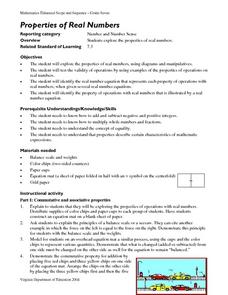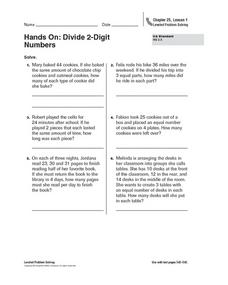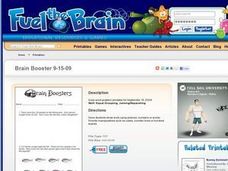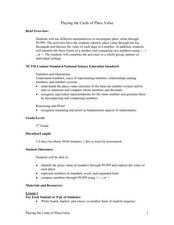Fuel the Brain
Equal Grouping, Number of Groups & Number of Sets
Your class will enjoy solving and illustrating these word problems involving equal grouping of numbers and number sets. Your visual learners will benefit if you provide manipulatives or a hundreds board while solving.
Illustrative Mathematics
Equality Number Sentences
Understanding the concept of equality is fundamental to the success of young mathematicians. To explore this basic idea, children compare the dots arranged in pairs of rectangles in order to determine whether or not they contain an equal...
Curated OER
Sharing or Grouping?
In division, word problems often help learners understand the application aspect of the math. By prompting them to label division problems as either grouping or sharing, this worksheet takes a less intimidating and more relatable...
EngageNY
Rational Numbers on the Number Line
Individuals learn how to plot rational numbers on the number line in the sixth lesson of a 21-part module. They identify appropriate units and determine opposites of rational numbers.
Curated OER
Equal or Not Equal
Tiny mathematicians count the number of shapes (up to 8) in pairs of object groups and identify the sets as equal or not equal. Five practice problems. They also draw 2 groups of shapes that are not equal. A focused tool that requires...
Curated OER
Guided Lesson Explanation for More, less, or Equal
How do you teach kindergartners to count? Use this scripted explanation to show pupils how to solve problems that ask them to determine whether the number of objects in one group is greater than, less than, or equal to the number of...
Curated OER
Equal Rights
Students experience what it would be like for any one group to make the laws that all people are to follow.
Curated OER
All Kinds of Numbers
Count and compare numbers and fractions using "greater than" and "less than." Learners count on by 2s and 10s and represent the end number with base ten blocks, counters, and cups. They use circle stickers to illustrate fractions and...
Curated OER
Names for Numbers
In this mathematics worksheet, 1st graders identify various numbers and use counters to illustrate each fact given. Then they complete the math sentences correctly.
Curated OER
Number Line Snacks: Compare Numbers to 10
Kindergarteners put Cheerios or cheddar fish on two number lines (up to 10 each) and identify which number the snack pieces indicate. They compare numbers after eating a few of each snack, and get an introduction to addition and...
Fuel the Brain
Skill: Equal Grouping with Leftovers
Learning to complete word problems can be challenging, especially when the answers can contain leftovers. Through reading, solving, and illustrating each problem, your youngster will understand that answers can contain leftovers.
Virginia Department of Education
Properties of Real Numbers
Students use paper cups and colored chips to observe properties of operations with real numbers. As a class, students brainstorm and use manipulatives to demonstrate associative, commutative, distributive identity and inverse properties....
Curated OER
Hands On: Divide 2-Digit Numbers
In this division worksheet, 4th graders solve 6 story problems in which two digit numbers are divided by single digit divisors.
Curated OER
Learning Even and Odd Numbers
In this math lesson, young learners receive a numeral written on a paper and arrange themselves in chronological order. They illustrate skip counting by 2's, 5's, and 10's using their numerals and then complete an individual 100 chart by...
Curated OER
Equal Grouping, Joining/Separating
Fishing is fun because you can share what you catch. Learners test their addition skills to see how many fish are caught by each person. Another total is given, but all the fish have to be distributed equally. Hope your learners...
C-SPAN
14th Amendment Equal Protection Clause
Two Supreme Court cases, Plessy v. Ferguson and Brown v. Board of Education take center stage in a lesson about the Equal Protection Clause of the 14th Amendment. Class members research both cases to compare and contrast the rulings.
EngageNY
Ordering Integers and Other Rational Numbers
Scholars learn to order rational numbers in the seventh lesson plan in a series of 21. Reasoning about numbers on a number line allows for this ordering.
EngageNY
Ordering Integers and Other Rational Numbers II
Individuals build on prior knowledge to order a set of rational numbers from least to greatest or greatest to least. As part of the lesson, they order rational numbers written in different forms.
EngageNY
The Opposite of a Number's Opposite
It's said that opposites attract, but what about opposites of opposites? Individuals learn about the opposite of opposites using number lines. They complete a group activity in which members determine the opposite of opposites of integers.
Curated OER
Development of Federal Civil Rights Acts : 1950's - Present
Students use the Internet to research one of five cases associated with Brown v. Board of Education and then join a group with people who researched the other four.
Curated OER
Playing the Cards of Place Value
Third graders explore place value to the ten-thousands place. In this amazing, 21-page place value lesson plan, learners represent numbers in standard and expanded form, and use technology to represent numbers to 9,999.
Curated OER
Comparing Two Digit Numbers Using Symbols
Second graders compare two digit numbers. In this comparing numbers lesson, 2nd graders discover greater than and less than symbols. Students read Five Little Monkeys Sitting In A Tree and use the story as a model for comparing numbers....
Curated OER
Two Squares are Equal
This problem is sure to get your young mathematicians thinking. The idea sounds simple: one equation, solve it as many ways as you can. This is meant to get at a deeper understanding of solving quadratic equations, including some more...
Illustrative Mathematics
Dividing by One-Half
Understanding when to divide by two or one-half can be confusing. Here is an activity that gives four different scenarios. It is up to your number crunchers to decide if they divide by two or one-half. The easiest way to approach the...

























